This episode of the Crime Cafe features my interview with crime writers David Bushman and Mark T. Givens.
Check out our discussion of the fascinating true story that inspired the show Twin Peaks.
Download a copy of the transcript here.
Debbi: Hi, everyone. This is the Crime Café, your podcasting source of great crime, suspense and thriller writing. I'm your host, Debbi Mack. Before I bring on my guest, I'll just remind you that the Crime Café has two eBooks for sale: the 9-book box set and the short story anthology. You can find the buy links for both on my website debbimack.com under the Crime Café link. You can also get a free copy of either book if you become a Patreon supporter. You'll get that and much more if you support the podcast on Patreon, along with our eternal gratitude for doing so.
Hi, everyone. Today I have two guests with me - David Bushman, who's the author of five books: two on true crime - why is that so hard to say? - two on true crime and three on pop culture. And Mark Givens, the creator and host of the Twin Peaks–centric podcast Deer Meadow Radio. Together, they have researched and written this book, Murder at Teal's Pond, a really excellent book, I have to say. Welcome to the show, guys. Thank you for being here, David and Mark. I really appreciate it.
David: Thanks for having us. Thank you.
Mark: Thank you, Debbi.
Debbi: It's my pleasure, believe me. I'm a big fan of Twin Peaks, and I really enjoyed your book as well. It was a fascinating look at how this ... you know, the inspiration for the show. Tell us how you met and what led you to collaborate on this book.
David: Mark, go ahead.
Mark: I thought you'd go first, David. Okay, I'll go first this time. We usually go back and forth. Well, like we were talking a little bit, Debbi, before we got started, and you just alluded to, we were both big Twin Peaks fans, which if people don't know was a show from the late eighties, early nineties that didn't last very long, but was very critically acclaimed and had a cult following decades later. To be honest, we're not going to all the Twin Peaks conventions every year, but when they announced that a new show was coming back, I think both David and I kind of remembered the old show and got interested in it.
And then, like you said in the intro along different lines, David ended up writing a book called Twin Peaks FAQ. And in my spare time, I do a podcast called Deer Meadow Radio, which you guys still check out. So for both of those projects, I think we both encountered this story independently, and we're both pretty struck by it because in today's internet age, anything that has any kind of following. Everyone knows all the stories behind Star Wars or Star Trek or whatever, but I think because of that gap in time, there were still a few stones that hadn't been completely explored. It had kind of gone dormant, and this was one of them. My recollection of how we found this story was, once or twice over the years, the co-creator, Mark Frost, had alluded to it as something that he knew as a child. A ghost story almost that his grandmother would tell him up in upstate New York where he would have summer vacation with his grandparents, and so he just kind of knew it as a ghost story. Was it even a real thing? Was this a real girl or just somebody made up a folk story?
But he did have a few scant facts. At one point, I think he did go back and research, so he knew a couple things, and long story, longest story kind of short, we pieced that together and finally found this was actually a big deal back in the day and it was a very interesting case with parallels to Twin Peaks, even though Mark Frost didn't really know all those details. It was just kind of the situation of a murder of a beautiful young girl. Her body is found washed up on shores in a small town, and there's lots of suspects and all kinds of interest. So those are the parallels, that I guess just kind of happened situationally.
David and I were both very drawn to this story for the same reasons we were drawn to Twin Peaks, and if I recall correctly, I did on my podcast, maybe my third episode was about the Hazel Drew story. You can go listen to it still. It's now very dated because we were just uncovering things at the time. It's a piece of history, but it's not a known piece of history, so we had to do a lot of digging for this time and era.
Anyway David independently had also, I think while researching for his book also uncovered this. And I think he just called me out. I think he heard my podcast and just Facebooked me or somehow we had a call and that was it. And then we just started looking into it and it went from there.
Debbi: That is really interesting. What was it like working on this? How much time did you put into research and how did you divide up the work? How did you manage to work together?
David: It took five or six years from concept to publication, so there was a tremendous amount of research involved. A lot of it, some of it was done online. A lot of it was done at the local library in Troy, New York, and then a lot of it was done by talking to people in the neighborhood or trying to track down people who were ancestors - I'm sorry - descendants of people who were involved in it in one way or another. It was really hard. I mean, there were no official records other than newspaper reports, which were not that reliable because they were always contradicting not only each other, but sometimes themselves. So it was really hard from that perspective.
We did a lot of interviewing of people up in the neighborhood. We spoke to some relatives of the victim, Hazel Drew. We made some really good contacts up in the neighborhood of people who connected us with other people. We had roundtable discussions where like 10 people would sit around and talk about all the stories that they had heard about Hazel. And in terms of working together, Mark at the time was living in the D.C. area and I live in New York, so we did a lot of communicating through phone or the internet. It wasn't a finely demarcated line, but I guess there was to an extent certain things. Mark, I know, was really interested in the politics of the area of the time, and he was really interested in tracking down through Ancestry, that thing, so I sort of left that to him. Then there were other areas that were of more interest to me, and we just kind of worked it out. It was pretty smooth. I think it was pretty smooth sailing for the two of us. We had minor disagreements maybe about things, but we just worked them out.
Debbi: What were the areas of particular interest to you? Mark's was political and yours was what?
David: Well, definitely interested in crime. We found some cases that - I was interested in the crime itself. Both Mark and I were both interested in newspapers. I have a newspaper background. I was a reporter in the consumer press for a while, and then I moved over to the trade press. I went to journalism school. I have that background. The newspapers were a really interesting story themselves, and they sort of led us to this guy William Clements, who was a mean character in the tabloid coverage of the murder, and Mark really got into him. But the newspaper story, related crimes or crimes that may have been related, those kinds of things, we were both more interested in the politics. There were times that only I could go up there, and so I wound up talking to certain people, and then other times when Mark was only able to get up there, so whatever direction those conversations took us in, that became that person's purview, more or less. But we both signed off on everything.
Chapters or halves of chapters went back and forth and we made suggestions and I think that we have different strengths too as researchers and writers, and I think that we really complimented each other well. I think Mark can go down rabbit holes without losing his patience better than I can. I have a paper background. I'm a little bit more like, well, we have to move on now, but those kinds of things work to our advantage, I think
Debbi: Differing perspectives. Gives it more diversity, as it were. So you guys kind of complimented each other in a way?
David: I think so, yeah.
Mark: It worked really well. Most of the time, I forget how many years it was - five or six, David said - most of that time was exploratory, not actually writing, I would say. The last year or so, I was starting to write. So I think for both of us, that was just more fun than anything. We both kind of have careers doing research and things like that, so this was applying that to something you are really interested in. It was great, yeah.
Debbi: That's really cool.
David: We also complimented each other, because every time we went up to Troy and went somewhere, Mark would leave something behind like his computer or his wallet or his telephone, and I was always there to remind him that he had lost it. So.
Mark: The story keeps getting bigger every interview.
Debbi: Yeah. Oh my goodness. Well, apparently at the time, this particular murder captured nationwide media attention. That was something that really surprised me. What was it about this particular case that would draw so much attention?
Mark: I go back to what we're talking a little bit about what made Twin Peaks such a good story. So much mystery, so many unanswered questions, so many suspects, so many red herrings. We could still ... David probably is maybe done with it, but we could still keep looking at this. If you read our book, we claim to have solved it. But with Hazel, there's always questions about why and who else was involved and so forth. We do think we put our fingers on the people who did the crime, but in terms of why, and again, the context and well, then why is she quitting her job? So many unanswered questions that you can just keep looking at this. I mean, we looked at this for five or six years. I think you had asked earlier about the time commitment, and it would vary when you would have the time. But we were always kind of looking at this. There's really like a small team behind this book that we acknowledge. Locals who were equally interested, if not more so, always digging up new leads, every character.
David mentioned Ancestry.com, newspapers.com. Where Hazel kind of sat in society also opened everything up. She came from a lower class background, the country, and then in the city, kind of in the lower class. But because of her job as a domestic servant, she worked for three very powerful, prominent politicians, and one was a prominent professor as well, so there's all these connections. She's this young, beautiful woman who just got killed, and there's no obvious explanation for it. Even after, like you said, it was intensely scrutinized and the nation as a whole, the whole country was kind of following this for at least two or three weeks, and they just ended up with we don't know who did it. Me and David, that is one thing, we kind of go back and forth on how hard maybe the investigation was trying to find out who did it, and if you read our book, we definitely get into that.
Debbi: For sure.
Mark: But there's a lot of people questioned and a lot of people drawn in, because another answer to your question is, Hazel was sort of this uniquely social being who just seemed to have all these kinds of relationships, and it's like which one of those threads was the one that got her killed and thrown in the pond?
David: There also were some very tabloid-y... It was an era of .. not unlike today, where there were tabloids and there were tabloid-y - which is a word I just made up - aspects to this. There were rumors that maybe she had been pregnant. Maybe she had a secret lover and things like that, that I think also heightened the interest of the media at a time where there were so many papers and huge battles going on for circulation, so that was part of it too.
Debbi: That's a great point. Yeah. That was that time period, wasn't it? So how closely do you think Hazel's life was parallel to Laura Palmers? How much do you think was fictionalized? Any thoughts?
David: Well, yeah, I think we were surprised by some of the similarities we found. Things like Laura had a diary and Hazel had this big trunk of letters that she kept the original copies of, which were discovered during the investigation that not everybody knew about. There was that. There was the fact that they were approximately the same age. They both were young blonde women. They both were said to be very beautiful and very charismatic. Clearly, there are elements of Laura's story that are way, way out there, that there are no similarities to all that. Laura had some strange things and some tragic things going on in her life with her father and her mother, and possibly some cosmic entity. That's just way out there.
But I think it was a kernel of an idea for Mark Frost, and I think that he didn't even, like Mark Givens just said before, I don't think Mark Frost was fully aware of all of the analogies that we uncovered, but there were also two completely different stories in some way. I mean, the small town was similar. It was an old lumber town. There were things that we found out along the way that really struck us because of the similarities. But it depends if you're defining Laura Palmer's experience or trauma through the lens of what happened to her because of her father and Bob, then that's where the similarities completely are not there.
Debbi: It's very interesting. Kind of creepy and interesting at the same time.
Mark: It's like Twin Peaks.
David: Yeah. I mean, in some ways Laura's ... I mean, in some ways Hazel's stories look scarier because it's more real. There was no Bob per se, and I guess it depends on what you think Bob is, but there was only Bob in the sense that Bob as the symbol or iteration or personification of man's ability to commit evil deeds. I think it was, Alfred ... Albert in the - well, I'll never live that one down - Albert in the Twin Peaks world who proposed that solution to the question of who Bob was. But Hazel was really killed by a real person, and this person got away with it, and we don't know why, and in some ways, that's a much scarier thought.
Debbi: And it just strikes me that she's not a celebrity. She could have been anybody at that time, and she never got justice. Nobody ever found the killer. That story could have just been buried and nobody would know about it, but it happened to hit at a certain time, which is very interesting. What advice would you give to anyone who's interested in writing for a living or collaborating on a book?
Mark: David is the one with all the books, but I guess I'll chip in. Find yourself a Bushman, and then latch yourself on. I think what helped get us gone … you know, writing is hard. You guys I'm sure know that. For me, I can be ADD so just sitting down and doing all that is hard. But in terms of this project and getting it launched, we were lucky to kind of find a unique angle. True crime we found is very popular, of course, but to kind of stand out, you need something, so keep your eyes open. David and myself have, since the book's been published, talked about a couple different projects perhaps, and I think that's what we're looking for. Not something exactly like this, but something that catches peoples' interests.
Something we talked about is why this was such a good story. In some ways it was. What we did was find a good story, and then you just have to kind of present it. And then just collaborating, if that's something you want to try. That does have challenges. Find somebody you get along with. Me and David get along pretty well together. You're gonna have to compromise on certain things, so that would probably be a whole other episode maybe.
Like I said, most of the time we were doing research and doing field trips and stuff, and that was all great, and then at some point, we did have to start putting words on paper. And at first, without getting too much into it, our words were different, we'll say. So you have to ... as you can expect. I mean, everyone's bringing different things, so we had to figure that out, but as we also said, there were strengths from that too because you are getting hopefully the best of both perspectives.
Debbi: Absolutely.
David: Collaboration also is good … Sorry, Debbi … Collaboration is also good because writing is very lonely, and also sometimes, if you don't see the light at the end of the tunnel, it becomes easy to get discouraged. I think that having someone who's counting on you not to get discouraged and to do what you have to do is a huge plus, and I know that for me, this relationship provided that, and that's why I want to do another book with Mark, and I think we have found something, and I think that I would much rather do it with him than without. But there are definitely challenges to it and writing style is one, and, and so on, but to me, if it connects the right way, you're better off.
In terms of writing in general, I think that that's it. It is just very, very lonely, and sometimes if you don't have the publishing deal before and you're writing without a signed deal at the time that you're writing, it sometimes can be difficult to inspire yourself to keep going. But if you really believe in the project - and there's so many ways to be published now anyway - so you can get your book published, but that's I think the main challenge for me is just getting inspired sometimes.
Debbi: Yeah. Yeah, that can be hard. Is there anything else you would like to add before we finish up?
Mark: No. Go check out our book if you haven't. Always asking people. It's hard to do that in these kinds of conversations where you want people to go get the book, but we do think we solved it, like I said, to a degree, so I'm always looking for feedback on that. If people think we're wrong, please let us know, or... That's always interesting. I do want to throw out there too. I haven't brought this up with David, at least for a while, but you mentioned I do have or I had a podcast, Deer Meadow Radio, deermeadowradio.com, but that was a Twin Peaks-focused podcast. We have talked over the years about maybe using that platform to do something with the book, and I've been looking at that again recently. So if people want to check that out, I think episode 3 would be like the old, old, old Hazel Drew episode, if you're not even that interested in Twin Peaks, but a way to explore the book a little bit more. We had some thoughts on that, and I think that might be coming in the near future. Again, I haven't talked to David about that as well. I probably need his participation.
David: One thing, Debbi, that I would want to add is that when we were first shopping this book around, and I think Mark was right, that there is a lot of true crime out there, and what we had that was unique was the Twin Peaks connection. I think Twin Peaks was back in the zeitgeist then because of the Showtime reboot, but we did not get our first … it wasn't the first publisher we went to who said yes. I mean, we got some yeses, including Metabook, which is now Synergistic, which is the company that eventually got us the deal with Thomas & Mercer. But publishers and agents for aspiring writers, they say no, and it's just another opinion. You should never let what they say discourage you, because I can tell you that, for example, one woman said to us at a publishing company that we never publish books where the murder is not solved, which is ludicrous because there's Jack The Ripper and there's the Golden Gate Killer for a long time, and the Black Dahlia and on and on and on. But they have this ...
Mark: I remember at that meeting, David. I'm like, we're solving it. Just give us another six months.
David: And that was actually part of what's actually, we liked it better that it was unsolved because it gave us this whole rabbit hole to go down, but my point is that you should never get discouraged if one agent or one publisher says something to you. It's just their opinion. They are 9 times out of 10 going with conventional wisdom. The 10th time they're coming from someplace of insanity. So, you should stick with it if you think that you have something that you want to get out there and you believe in it, don't listen to people who are saying no, who are discouraging you.
Debbi: I love it. I love it. Thank you so much for saying that. I believe in that. Totally.
David: Me, too.
Debbi: And I just want to thank you guys so much for being here. Thank you very much.
David: Thanks.
Mark: Thank you for having us.
Debbi: Sure thing. And just a reminder that if you'd like to see the bonus episodes that I have with my guests, just become a Patreon supporter and you can get access to bonus episodes, ad-free episodes and more. And if you would, please leave a review for the podcast, because that always helps. So until next time, when our guest will be Kathleen Kaska, take care and happy reading.


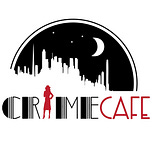


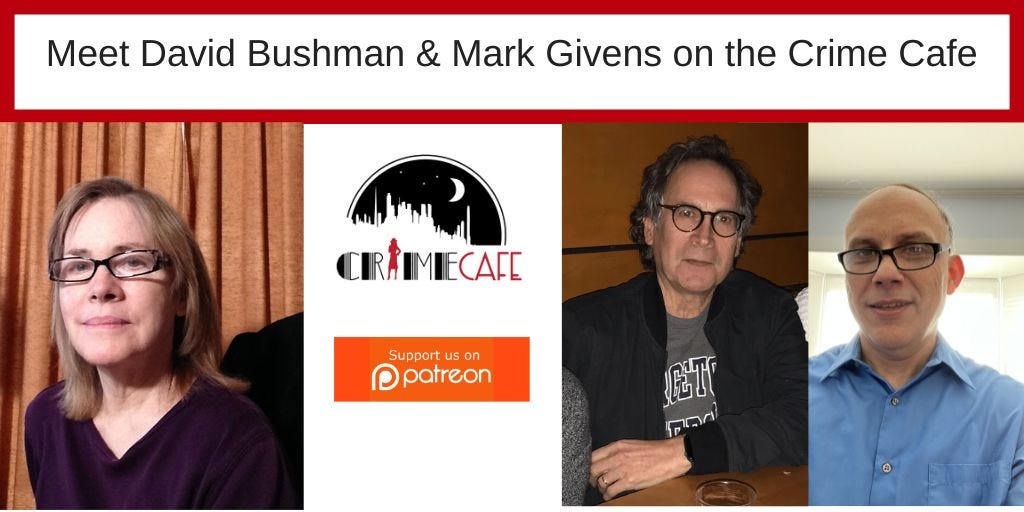




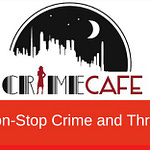
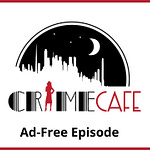
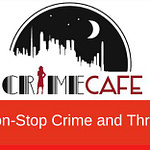


Share this post